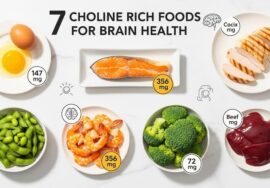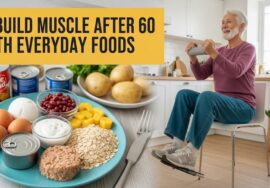Simple Food Triggers You Should Know About Today
Inflammation isn’t always bad. In fact, it’s a natural defense mechanism that helps your body heal. But when inflammation becomes constant, it can turn into a problem—one that often goes unnoticed until symptoms like joint pain, fatigue, or digestive issues show up. A major culprit? The food on your plate.
Let’s break down common foods that quietly stir up inflammation in your body—and what to eat instead.
Table of Contents
- Packaged Meats: A Hidden Firestarter
- Refined Sugar: Feeding the Inflammatory Cycle
- Industrial Oils: Not as Healthy as You Think
- White Bread and Refined Grains: Quick Burn, Long Fallout
- Alcohol: Weakens the Gut Wall
- Dairy: Not a Problem for All, but Some Should Be Cautious
- Artificial Sweeteners: Zero Calories, Real Issues
- Refined Gluten: A Silent Gut Trigger
- Smart Swaps for a Low-Inflammation Diet
- Frequently Asked Questions (SEO + Discover Optimized)
- Final Thoughts: Clean Eating Is Anti-Inflammatory Living
1. Packaged Meats: A Hidden Firestarter
Processed meats like bacon, ham, sausages, and deli slices often contain preservatives like sodium nitrite. These additives are used to prolong shelf life and keep meat looking pink, but they’ve also been linked to oxidative stress—a reaction in your body that can spark inflammation.
Watch out for:
- Pre-sliced deli meats
- Bacon with artificial smoke flavor
- Canned meats with long ingredient lists
2. Refined Sugar: Feeding the Inflammatory Cycle
Sugar might taste sweet, but the way it behaves in your body isn’t. High sugar intake—especially in the form of fructose syrups and hidden sugars in snacks—can stimulate the release of inflammatory proteins. Over time, this can worsen skin flare-ups, body aches, and even blood sugar spikes.
Common sources include:
- Breakfast pastries
- Flavored yogurts
- Sweetened iced teas and sports drinks
3. Industrial Oils: Not as Healthy as You Think
Many everyday cooking oils, like corn oil, soybean oil, and sunflower oil, are heavy in omega-6 fatty acids. Although omega-6 is essential in small amounts, too much—especially without enough omega-3—can tip your body into an inflammatory state.
Better options include:
- Olive oil (cold-pressed)
- Avocado oil
- Coconut oil (in moderation)
4. White Bread and Refined Grains: Quick Burn, Long Fallout
When you eat white bread, crackers, or pasta made from enriched flour, your body rapidly digests these carbs into sugar. This fast absorption process not only raises your blood sugar but also activates inflammatory pathways.
Swap with:
- Whole grain bread
- Rolled oats
- Quinoa
5. Alcohol: Weakens the Gut Wall
Drinking alcohol regularly—especially in excess—can affect your gut health. Alcohol weakens the gut barrier, allowing toxins to leak into your bloodstream. This process, sometimes referred to as intestinal permeability, can lead to low-grade inflammation throughout your system.
Tips for minimizing damage:
- Stick to one drink per day (if at all)
- Hydrate well alongside alcohol
- Choose organic red wine over sweet cocktails
6. Dairy: Not a Problem for All, but Some Should Be Cautious
Dairy products like milk, cream, and cheese may not bother everyone. But if you’re sensitive to casein, the main protein in dairy, your body might react with symptoms like bloating, joint stiffness, or skin irritation.
Try eliminating for a week if you experience:
- Puffy eyes or sinus congestion
- Gas or bloating
- Joint discomfort
7. Artificial Sweeteners: Zero Calories, Real Issues
Sweeteners such as aspartame and sucralose are often found in “diet” products, but their effect on the body isn’t so friendly. Research suggests they can upset gut bacteria and may even disrupt the immune system, paving the way for inflammation.
Sneaky places they hide:
- Sugar-free gum
- Light yogurt
- Flavored protein powders
8. Refined Gluten: A Silent Gut Trigger
Even if you don’t have celiac disease, highly refined gluten found in pastries, cakes, and white flour may irritate your digestive system. Some individuals report fewer aches and sharper thinking when they cut out ultra-processed wheat from their diets.
Not all gluten is created equal. Look for:
- Sprouted grain bread
- Ancient grains like spelt or einkorn
- Certified organic whole wheat
Smart Swaps for a Low-Inflammation Diet
- Use turmeric, ginger, and garlic in your cooking to reduce inflammation naturally.
- Choose snacks like berries, pumpkin seeds, or roasted chickpeas instead of cookies or chips.
- Aim to fill half your plate with colorful vegetables at lunch and dinner.
- Cut back on deep-fried fast food and sugary beverages whenever possible.
Frequently Asked Questions (SEO + Discover Optimized)
❓ What is the number one food that causes inflammation?
Refined sugar is at the top of the list due to its ability to rapidly increase insulin and trigger inflammatory molecules in the body.
❓ Can dairy cause inflammation in healthy people?
Not always. However, individuals who are sensitive to casein protein may experience digestive upset and systemic inflammation.
❓ Are all oils bad for inflammation?
No. Oils like olive and avocado oil are anti-inflammatory, but corn, soybean, and sunflower oils may do more harm than good when used excessively.
❓ How do I know if food is causing inflammation?
Look for patterns in symptoms like fatigue, joint stiffness, headaches, and bloating after eating certain foods.
❓ Does gluten cause inflammation in non-celiacs?
For some people, yes. Processed gluten can irritate the gut lining, especially when combined with a diet high in sugar and low in fiber.
Final Thoughts: Clean Eating Is Anti-Inflammatory Living
You don’t have to follow extreme diets or spend a fortune to reduce inflammation. Start by replacing ultra-processed foods with natural ingredients and paying attention to how your body responds. Eating for inflammation is more about balance and less about restriction. When in doubt, go back to the basics: real food, real ingredients, and real health benefits.









Pingback: Healthy Fats Guide U.S. Dietary Guidelines Best Practices
Pingback: Dandelion Root for Seniors Benefits Safety Cancer Research
Pingback: Gentle Body Reset After 60 with 7 Simple Foods for Better Health
Pingback: Collagen-Boosting Vegetables for Seniors Leg Strength
Pingback: Natural Joint Pain Relief for Seniors 7 Proven Home Remedies
Very good written information. It will be beneficial to everyone who usess it, as well as yours truly :). Keep doing what you are doing – can’r wait to read more posts.